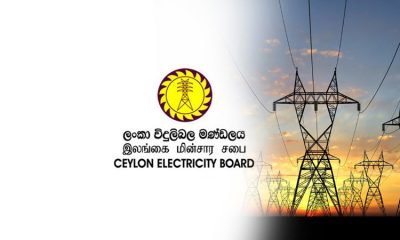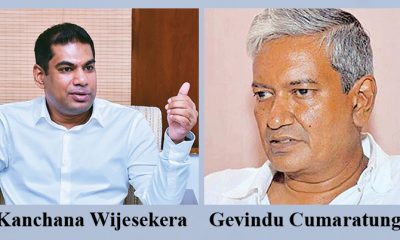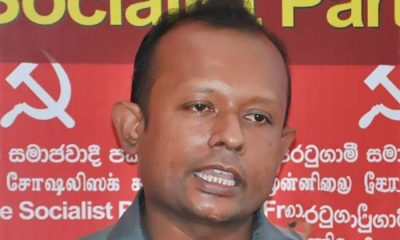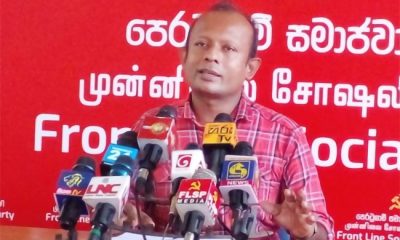News
Replacing a state monopoly with a private sector oligopoly
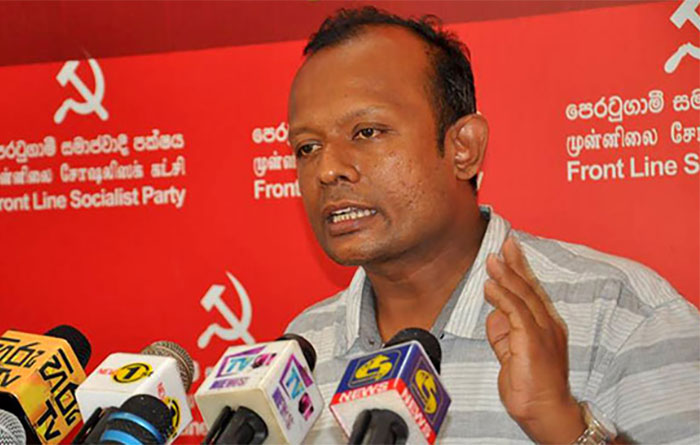
Proposed Sri Lanka Electricity Bill
By Rathindra Kuruwita
If the Sri Lanka Electricity Bill, currently under consideration in Parliament, is enacted, it could empower a handful of private companies, owning transmission lines, to exert undue control over the nation, potentially holding it hostage, the Education Secretary of the Frontline Socialist Party (FSP), Pubudu Jayagoda said.
The Bill, if passed, will replace Ceylon Electricity Board Act (No. 17 of 1969) and Sri Lanka Electricity Act (No. 20 of 2009).
One of the stated objectives of the Act is to attract new investment into the Electricity Industry, supported by segregation and separation of the activities of the Electricity Industry, currently vested in a single Government owned entity, by the incorporation of independent corporate entities in whom shall be vested all activities connected with the generation, transmission, distribution, trade, supply and procurement of electricity and who shall be responsible for the efficient management of these activities and for the creation of market competition, he said.
The other objectives are to facilitate private sector investment in every activity of the Electricity Industry using stock market listing and public private partnership modalities and transition and reorganisation of the Electricity Industry and the implementation of identified reforms based on timely and essential legal, structural, oversight and market-based changes.
Jayagoda remarked that essentially, the government has shifted its stance from viewing electricity as a public good, which it has a duty to furnish, to subjecting the sector to market forces. He noted that with the enactment of the Act, the government relinquishes its responsibility to provide electricity to households for improving their quality of life or to enterprises to stimulate economic endeavours.
“In the recent past, the electricity tariff increased dramatically. Electricity was disconnected in almost a million households and in 11,000 industries,” he said.
Jayagoda pointed out that the tariff adjustments were implemented with the aim of enabling the CEB to achieve a profit of approximately 62 billion rupees. However, according to some experts, the CEB actually recorded a profit of about 90 billion rupees.
“We cautioned that these adjustments were not solely aimed at covering CEB expenses, as claimed by the government, but rather to generate substantial profits. Now, it’s evident to everyone that our concerns were valid,” he remarked.
Jayagoda said according to laws that govern the electricity sector states that the baseload, apart from peak hours, must be generated using the least cost sources.
“Hydro power is the source that we can use to generate electricity at the lowest cost. One can generate a unit of electricity, using hydro-power, under five rupees at most. But the cost spikes to about 40-50 rupees when a unit is generated by coal. A unit of electricity, generated by diesel, costs about 90 rupees, and the CEB buys at around 120 rupees when they purchase from private power plants,” he said.
Thus, it is obvious that the raison d’etre of this Bill is to legalize increased electricity tariffs, he said. The existing laws that govern the sector frowns upon high-cost private thermal power plants, Jayagoda added.
Jayagoda stated that this Bill eliminates these barriers and grants the Cabinet of Ministers the authority to decide on the type of power plants to be constructed. Currently, it is the responsibility of the CEB to determine the selection of power plants.
“The government wants to allow private companies to produce, distribute, and transmit electricity. Giving transmission lines to the private companies poses serious problems. Already, India’s Adani is building a 400 kv transmission line from Kilinochchi to Habarana. Adani got this without a tender. When we ask the Ministry of Power and Energy, they claim this is a government to government project and this there was no need to call for tenders. However, it is a private Indian company that is building the transmission line and thus tenders should have been called,” he said.
Jayagoda questioned the potential scenario where the government seeks to transmit electricity generated by another company through this line. He inquired about the financial implications for the other company, asking how much they would need to pay Adani for the usage of the transmission line.
“What will be the fee for access? And what if Adani refuses to permit electricity generated by other companies to pass through their transmission lines?” Jayagoda questioned. “While the government claims the Bill aims to enhance competition in the sector, in reality, it could result in the formation of an oligopoly controlled by a handful of companies that own transmission infrastructure.”
Jayagoda highlighted that the new Bill has diminished the authority of the Public Utilities Commission (PUC). In Sri Lanka, long-term generation plans are periodically devised, and tariff revisions are conducted. Currently, the PUC is responsible for overseeing the implementation of these long-term plans and determining the extent of tariff revisions.
“The new Bill effectively strips the PUC of its authority in these areas. Additionally, it grants the line minister the discretion to determine tariffs and oversee the implementation of long-term generation plans. Furthermore, the Bill restricts the PUC’s regulatory scope to large-scale power plants, excluding its jurisdiction over small power plants (11 and 33 kV plants). Ensuring that these power plants adhere to specific quality standards is crucial for safeguarding life and property. What are the potential consequences when private entities establish small power plants and generate electricity without any regulatory oversight?” Jayagoda questioned.
Jayagoda pointed out that the new Bill introduces a provision allowing Sri Lanka’s national grid to be connected to the grid of a foreign power, a clause absent in previous legislation. He emphasized that due to its geographical location, Sri Lanka can only feasibly be linked to the Indian national grid.
“Even more concerning is the provision in the Bill stating that it’s the Cabinet of Ministers who will determine the terms of any agreement if our grid is linked to another country’s national grid. This decision-making process has been heavily politicised,” Jayagoda said.
“What if India imposes similar conditions on us as they did on Nepal and Bhutan? In agreements with those countries, India mandated that they purchase a specified volume of electricity from India. As a result, Nepal is now compelled to buy Indian electricity at a higher cost, despite having the capacity to generate inexpensive hydro power. This fate could very well be awaiting us.”
News
US sports envoys to Lanka to champion youth development

The U.S. Embassy in Colombo welcomed the U.S. Sports Envoys to Sri Lanka, former National Basketball Association (NBA) and Women’s National Basketball Association (WNBA) players Stephen Howard and Astou Ndiaye, from June 8 through 14.
The Public Diplomacy section of the U.S. Embassy said that it would launch a weeklong basketball program intended to harness the unifying power of sports, made possible through collaboration with Foundation of Goodness and IImpact Hoop Lab.
While in Sri Lanka, Howard and Ndiaye, both retired professional basketball players, will conduct a weeklong program, Hoops for Hope: Bridging Borders through Basketball. The Sports Envoys will lead basketball clinics and exhibition matches and engage in leadership sessions in Colombo and Southern Province for youth aged 14-18 from Northern, Uva, Eastern and Western Provinces, offering skills and leadership training both on and off the court. The U.S. Envoys will also share their expertise with the Sri Lanka Basketball Federation, national coaches, and players, furthering the development of basketball in the country. Beyond the clinics, they will collaborate with Sri Lankan schoolchildren to take part in a community service project in the Colombo area.
“We are so proud to welcome Stephen and Astou as our Sports Envoys to Sri Lanka, to build on the strong people-to-people connections between the United States and Sri Lanka,” said U.S. Ambassador Julie Chung. “The lessons that will be shared by our Sports Envoys – communication, teamwork, resilience, inclusion, and conflict resolution – are essential for leadership development, community building, equality, and peace. The U.S. Sports Envoy program is a testament to our belief that sports can be a powerful tool in promoting peace and unity.”
News
Rahuman questions sudden cancellation of leave of CEB employees

SJB Colombo District MP Mujibur Rahuman in parliament demanded to know from the government the reasons for CEB suspending the leave of all its employees until further notice from Thursday.
MP Rahuman said that the CEB has got an acting General Manager anew and the latter yesterday morning issued a circular suspending leave of all CEB employees with immediate effect until further notice.
“We demand that Minister Kanchana Wijesekera should explain this to the House. This circular was issued while this debate on the new Electricity Amendment Bill was pending. There are many who oppose this Bill. The Minister must tell parliament the reason for the urge to cancel the leave of CEB employees,” the MP said.However, Speaker Mahinda Yapa Abeywardena prevented Minister Wijesekera responding to the query and said that the matter raised by MP Rahuman was not relevant.
News
CIPM successfully concludes 8th Annual Symposium

The Chartered Institute of Personnel Management (CIPM) successfully concluded the 8th Annual CIPM Symposium, which took place on 31st May 2024. Themed “Nurturing the Human Element—Redefining HRM in a Rapidly Changing World,” the symposium underscored the pivotal role of human resource management (HRM) in today’s dynamic global landscape. Since its inception in 1959, CIPM has been dedicated to advancing the HR profession through education, professional development, and advocacy, solidifying its position as Sri Lanka’s leading professional body for HRM.
Ken Vijayakumar, the President of the CIPM, graced the occasion as the chief guest. The symposium commenced with the welcome address by the Chairperson, Prof. Arosha Adikaram, followed by the Web Launch of the Symposium Proceedings and Abstract Book by the CIPM President. The event featured distinguished addresses, including a speech by Chief Guest Ken Vijayakumar, President of CIPM, and an address by Guest of Honor Shakthi Ranatunga, Chief Operating Officer of MAS Holdings Pvt. Ltd., Sri Lanka.
The symposium also featured an inspiring keynote address by Prof. Mario Fernando, Professor of Management and Director of the Centre for Cross Cultural Management (CCCM) at the University of Wollongong, Australia.
Vote of Thanks of the inauguration session was delivered by Dr. Dillanjani Weeratunga, Symposium Co-chair.
The symposium served as a comprehensive platform for researchers to present their findings across a wide range of critical topics in HRM. These included Cultural Diversity and Inclusion, Talent Development and Retention, Ethical Leadership and Corporate Social Responsibility, Adapting to Technological Advancements, Mental Health and Well-being at Work, Global Workforce Challenges, Employee Empowerment, and Reskilling and Upskilling.
The plenary session was led by Prof. Wasantha Rajapakse. Certificates were awarded to the best paper presenters during the valedictory session, followed by a vote of thanks delivered by Kamani Perera, Manager of Research and Development.
The annual symposium of CIPM was a truly inclusive event, attracting a diverse audience that spanned undergraduates, graduates, working professionals, research scholars and lecturers. This widespread interest highlights the symposium’s significance in the field of HRM, offering a unique opportunity for everyone to network and learn from scholarly brains.The CIPM International Research Symposium was sponsored by Hambantota International Port, Sri Lanka Institute of Information Technology (SLIIT), E B Creasy & Co. PLC, and Print Xcel Company.


